Signs of stomach cancer in dogs: Is Your Dog at Risk?

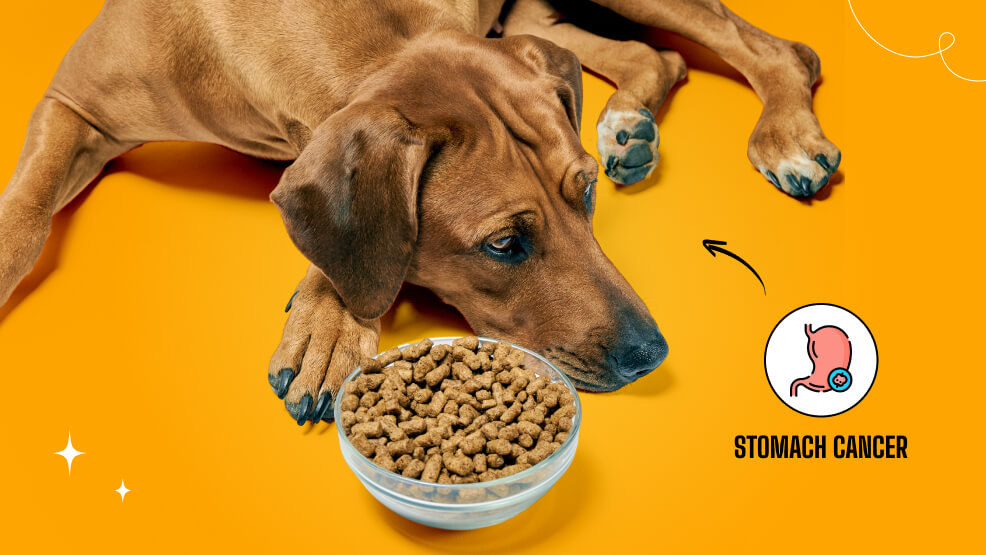
Stomach cancer, also known as gastric cancer, is a serious and relatively uncommon condition in dogs. This type of cancer originates in the lining of the stomach and can quickly spread to other parts of the body if left untreated.
While it may not be as prevalent as other types of canine cancers, it’s essential to be aware of the potential signs of stomach cancer in dogs. This is because early detection can significantly improve your dog’s chances of successful treatment and a better prognosis.
Common Signs Of Stomach Cancer In Dogs?
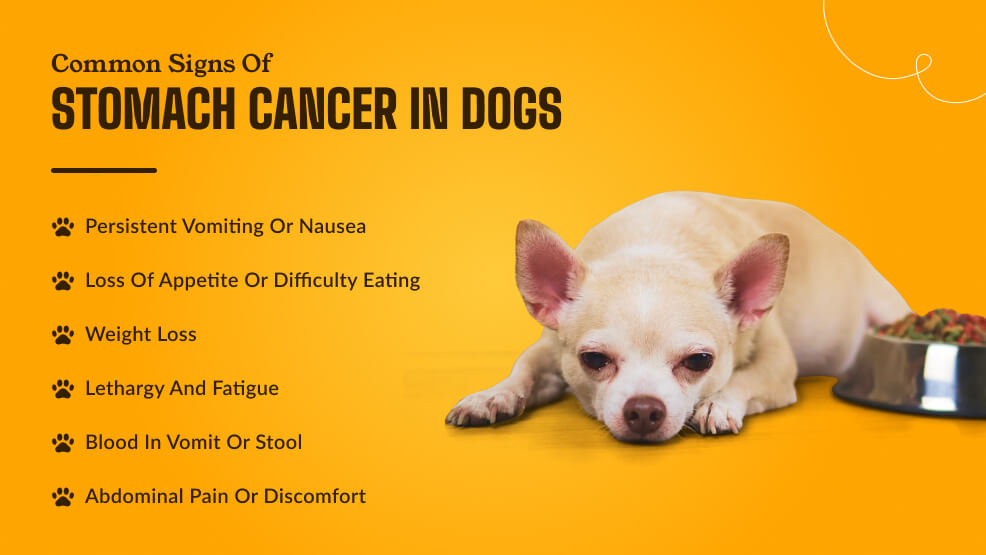
One of the challenges in identifying stomach cancer in dogs is that the early signs can be quite vague and can resemble other, less serious gastrointestinal problems. However, some of the most common symptoms to watch out for include:
- Persistent Vomiting or Nausea: If your dog is frequently vomiting or appears nauseous, it could be a sign of stomach cancer. This is often one of the first noticeable symptoms.
- Loss of Appetite or Difficulty Eating: Dogs with stomach cancer may experience a decreased appetite or have trouble eating due to discomfort or pain in the stomach.
- Weight Loss: Unexplained weight loss is another common symptom of stomach cancer in dogs, as the tumor can interfere with nutrient absorption and lead to a decline in body condition.
- Lethargy and Fatigue: Stomach cancer can cause your dog to feel generally unwell, leading to increased fatigue and lethargy.
- Blood in Vomit or Stool: Stomach tumors can bleed, which may result in the presence of blood in your dog’s vomit or stool.
- Abdominal Pain or Discomfort: Some dogs with stomach cancer may exhibit signs of abdominal pain, such as whining, restlessness, or reluctance to be handled around the stomach area.
It’s important to note that these symptoms can also be associated with other gastrointestinal issues. So it’s crucial to have your veterinarian thoroughly examine your dog and rule out other potential causes.
Potential Causes and Risk Factors of Stomach Cancer in Dogs
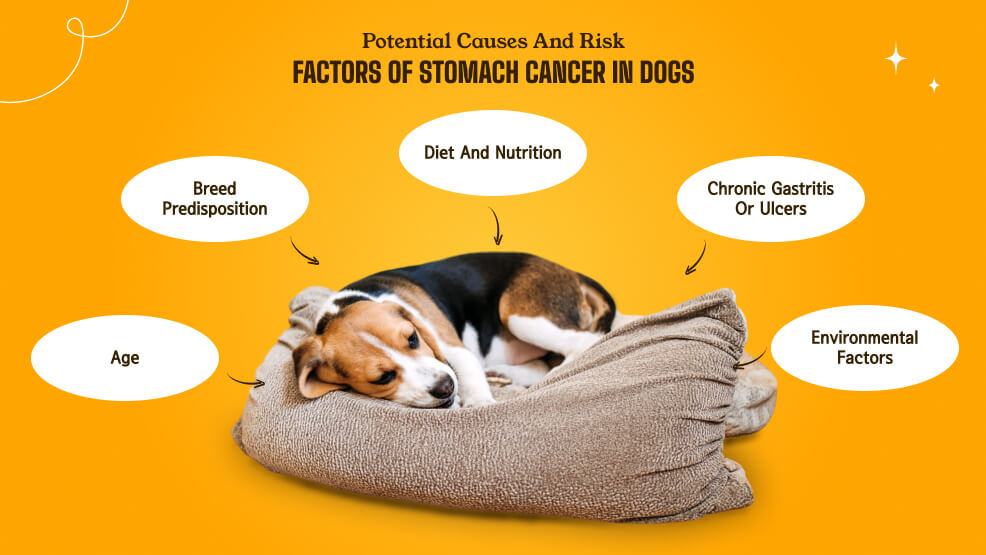
The exact causes of stomach cancer in dogs are not fully understood, but several risk factors may increase a dog’s likelihood of developing this condition:
- Age: Stomach cancer is more common in older dogs, with the average age of diagnosis being around 9-10 years old.
- Breed Predisposition: Certain breeds, such as German Shepherds, Boxers, and Staffordshire Terriers, may have a higher genetic predisposition to developing stomach cancer.
- Diet and Nutrition: Some studies suggest that a diet high in processed meats, nitrates, and preservatives may be linked to an increased risk of stomach cancer in dogs.
- Chronic Gastritis or Ulcers: Ongoing inflammation or irritation of the stomach lining, known as chronic gastritis or peptic ulcers, may contribute to the development of stomach cancer over time.
- Environmental Factors: Exposure to certain environmental toxins or carcinogens may play a role in the development of stomach cancer in some dogs.
It’s important to note that the presence of these risk factors does not necessarily mean your dog will develop stomach cancer. Regular veterinary check-ups and monitoring for any changes in your dog’s health can help to identify potential issues early on.
Diagnosing Stomach Cancer in Dogs
Since the signs of stomach cancer in dogs can be similar to other gastrointestinal conditions, it can be slightly difficult to diagnose. Your veterinarian will likely begin with a thorough physical examination, taking into account your dog’s medical history and any observed symptoms.
Some of the diagnostic tests that may be recommended include:
- Blood Tests: These can help identify any underlying issues or rule out other potential causes of your dog’s symptoms.
- Imaging Tests: Your veterinarian may order X-rays, ultrasounds, or even a CT scan to get a better view of your dog’s stomach and surrounding organs.
- Endoscopy: This procedure involves inserting a small, flexible camera into your dog’s stomach to directly observe the lining and potentially take a biopsy for further analysis.
- Biopsy: If a tumor or abnormal growth is detected, your veterinarian may recommend a biopsy to determine the nature and extent of the cancer.
Once a diagnosis of stomach cancer is confirmed, your veterinarian will work with you to develop the most appropriate treatment plan for your dog’s specific needs and condition.
What Are The Treatment Options for Stomach Cancer in Dogs
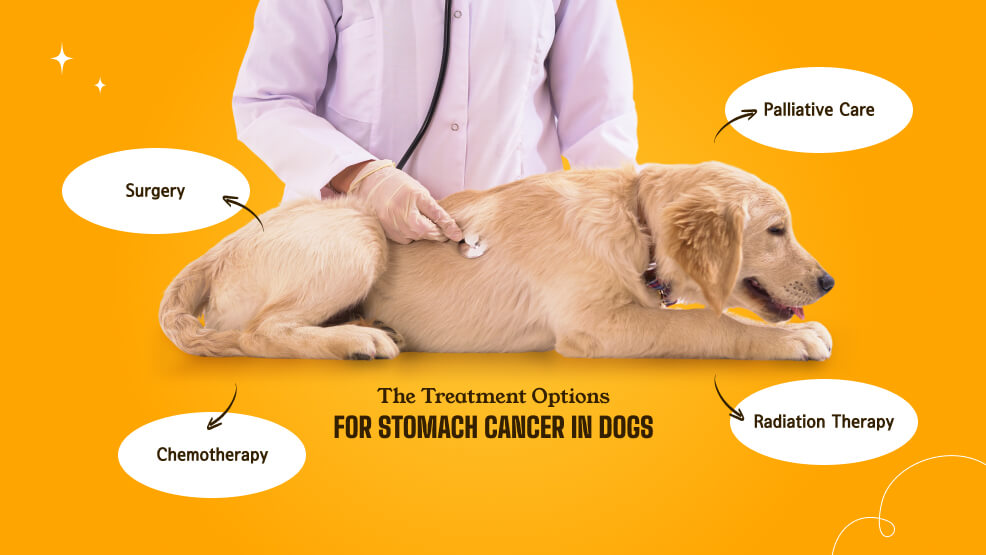
The treatment options for stomach cancer in dogs can vary depending on the stage and location of the tumor, as well as your dog’s overall health and age. Some of the common treatment approaches include:
- Surgery: In some cases, the cancerous tumor may be surgically removed, either partially or entirely, to help reduce the burden of the disease.
- Chemotherapy: Depending on the type and stage of the cancer, your veterinarian may recommend a course of chemotherapy to help shrink the tumor or slow the progression of the disease.
- Radiation Therapy: In certain cases, targeted radiation therapy may be used to help control the growth and spread of the cancer.
- Palliative Care: For dogs with more advanced or inoperable stomach cancer, the focus may shift to palliative care, which aims to manage symptoms and improve quality of life.
It’s important to work closely with your veterinarian to determine the most appropriate treatment plan for your dog, taking into account the potential risks, benefits, and your dog’s overall prognosis.
Supportive Care for Dogs with Stomach Cancer
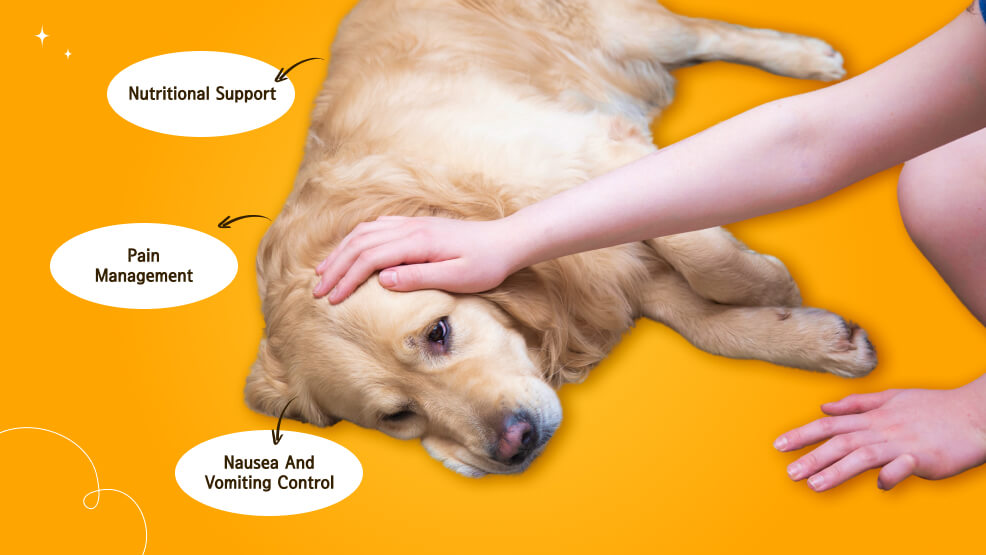
In addition to the primary treatment approaches, providing supportive care for your dog with stomach cancer is crucial to their overall well-being and quality of life. Some key aspects of supportive care include:
- Nutritional Support: Maintaining a healthy, balanced diet can be a challenge for dogs with stomach cancer, so your veterinarian may recommend specialized diets or supplements to help ensure your dog is getting the necessary nutrients.
- Pain Management: Depending on the stage and location of the cancer, your dog may experience abdominal pain or discomfort, which can be managed with appropriate pain medication prescribed by your veterinarian.
- Nausea and Vomiting Control: Medications may be used to help alleviate your dog’s nausea and vomiting, which can improve their appetite and overall comfort.
Emotional Support is also an important part of supportive care for dogs suffering from chronic illnesses like cancer. Don’t underestimate the importance of providing your dog with a loving, stress-free environment and plenty of affection during this challenging time.
By working closely with your veterinarian and implementing a comprehensive supportive care plan, you can help to improve your dog’s quality of life and maximize the effectiveness of their primary treatment.
What Is the Prognosis and Life Expectancy for Dogs with Stomach Cancer
The prognosis and life expectancy for dogs with stomach cancer can vary widely, depending on factors such as the stage of the cancer, the type of tumor, and the success of the chosen treatment approach. In general, early-stage stomach cancer that is surgically removed may have a better prognosis, with some dogs living for several years after treatment.
However, more advanced or inoperable stomach cancer typically has a poorer prognosis, with many dogs living for only a few months to a year after diagnosis. The median survival time for dogs with stomach cancer is generally between 3-12 months, depending on the individual case.
How To Prevent Stomach Cancer in Dogs?
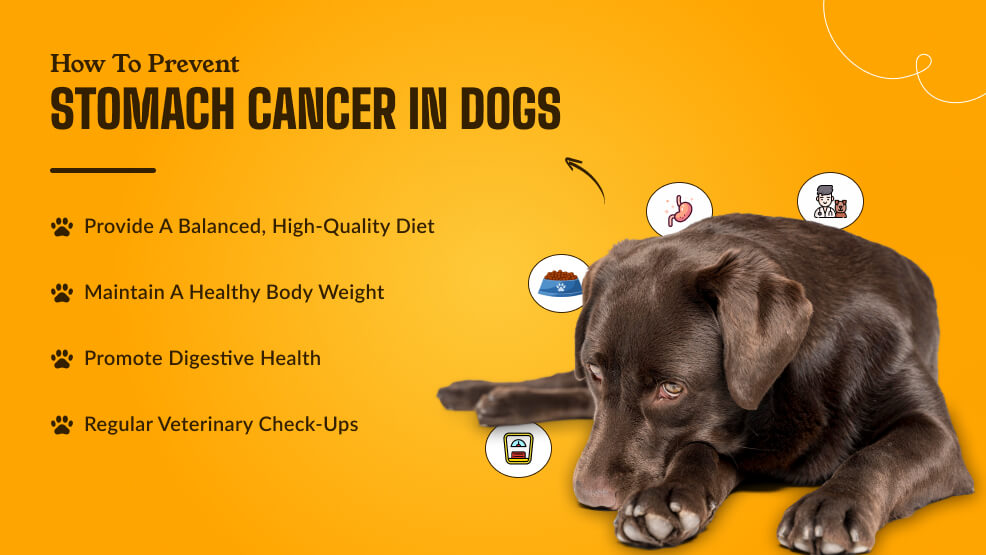
While there is no surefire way to prevent stomach cancer in dogs, there are some steps you can take to potentially reduce the risk:
- Provide a Balanced, High-Quality Diet: Feeding your dog a diet rich in whole, unprocessed foods and avoiding excessive amounts of processed meats, nitrates, and preservatives may help lower the risk of stomach cancer.
- Maintain a Healthy Body Weight: Obesity has been linked to an increased risk of various types of cancer in dogs, including stomach cancer, so keeping your dog at a healthy weight is important.
- Promote Digestive Health: Addressing any underlying gastrointestinal issues, such as chronic gastritis or ulcers, may help prevent the development of stomach cancer over time.
- Regular Veterinary Check-Ups: Routine veterinary exams and preventive care can help identify any potential health concerns early, allowing for prompt intervention and treatment if necessary.
By prioritizing your dog’s overall health and well-being, you can take proactive steps to reduce their risk of developing stomach cancer and ensure they enjoy a long, happy, and healthy life.
When to Consult a Veterinarian?
If you notice any of the signs of stomach cancer in your dog, it’s crucial to schedule an appointment with your veterinarian as soon as possible. Early detection and prompt treatment can significantly improve your dog’s chances of a successful outcome.
Some key signs that warrant a veterinary consultation include:
- Persistent vomiting or nausea
- Decreased appetite or difficulty eating
- Unexplained weight loss
- Lethargy or fatigue
- Blood in vomit or stool
- Abdominal pain or discomfort
Don’t hesitate to reach out to your veterinarian if you have any concerns about your dog’s health or if you notice any changes in their behavior or physical condition. Your veterinarian is your partner in providing the best possible care for your furry friend.









Leave A Comment